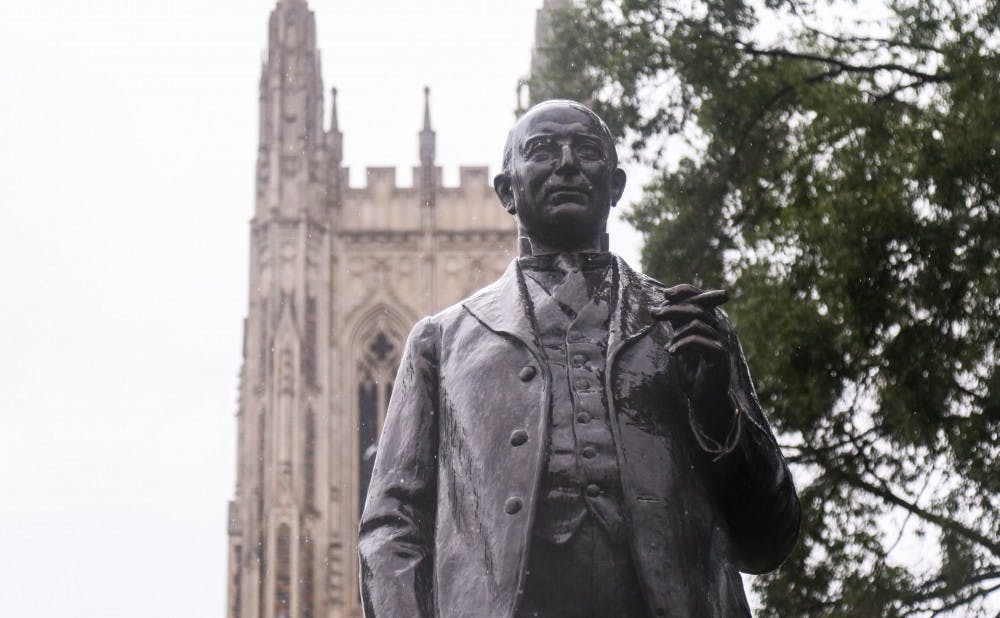While Duke students are currently petitioning for the reduction of fall 2020 tuition and housing, two class action lawsuits for the repayment of spring 2020 costs have been voluntarily dismissed.
Students across the nation have filed class action lawsuits against colleges and universities seeking reimbursement of spring semester tuition and fees because of campuses closing and shifting instruction online due to the rapid spread of COVID-19. Among them, “John Doe,” a Duke undergraduate whose name is kept anonymous in the complaint, and Yahya Talab, a master’s student in the Duke economics department, filed separate class action lawsuits in the U.S. District Court of the Middle District of North Carolina for such claims.
Talab and the anonymous student filed similar class action lawsuit claims—breach of contract, unjust enrichment and conversion—but there is a key distinction as to which party was sued. The anonymous student, who voluntarily dismissed his complaint July 14, sued Duke University, while Talab sued Duke’s Board of Trustees. Talab voluntarily dismissed his complaint July 27.
Michael Schoenfeld, vice president for public affairs and government relations, wrote in a July 21 email that the University does not comment on litigation. Schoenfeld declined to comment again July 27, after Talab dismissed his complaint.
Steve Berman and J. Michael Malone, two of the attorneys representing the anonymous student, did not respond to requests to comment. John Nestico and Glen Abramson, two of the attorneys representing Yahya Talab, and Talab did not respond to requests to comment.
Two weeks before the anonymous student dismissed his complaint, Governor Roy Cooper signed a North Carolina General Assembly bill into law that provides immunity to N.C. institutions of higher education that shifted their in-person classes online from legal claims to recover spring 2020 term tuition, fees or room and board expenses. In Doe v. Duke, the University filed a July 6 motion to dismiss the plaintiff’s complaint and filed an accompanying brief in support of dismissal, which cited the new North Carolina law.
In their complaints, the undergraduate student and Talab both alleged Duke or the Board of Trustees had breached its contract with students, who paid tuition and fees to the University, by closing Duke’s in-person instruction and facilities. As an alternative to the breach of contract claim, the anonymous student and Talab, respectively, alleged that Duke or the Board of Trustees had kept students’ prior payments of tuition and fees while in-person services and facilities were unavailable, and that this retention was unjust.
They each also made a third claim, conversion, which was that students paid their tuition or fees and, in return, should have had access to Duke’s in-person services, activities and facilities. By shifting online and issuing cancellations and closures due to COVID-19 precautions, but still keeping Duke students’ payments, the University or the Board of Trustees deprived students of their right to in-person services, activities and facilities, according to the complaints.
Hagens Berman Sobol Shapiro, the law firm that represented the anonymous Duke student, has participated nationwide in lawsuits against universities for the repayment of spring expenses. In addition to Duke, a class action lawsuit against Georgetown University was voluntarily dismissed after the federal district court judge struck the plaintiff’s complaint because the plaintiff used the pseudonym “John Doe” in the complaint and not the student’s real name, according to court documents.
Prior to either the anonymous Duke undergraduate or Talab’s lawsuits being filed, Duke promised in April to reimburse undergraduates for lost spring 2020 housing and dining fees.
While graduating students would receive a refund, returning students who lived on campus before March 13 would receive a prorated credit for their spring semester housing from March 13 to May 10 toward the cost of the fall semester, according to an April 2 email from Provost Sally Kornbluth and Executive Vice Provost Jennifer Francis. Returning students who lived on campus during the spring but would not live on campus in the fall would receive a refund “at that time,” the email adds.
Students on need-based financial aid received their unused dining funds during the remote spring semester. Students not receiving need-based financial aid would receive a refund if they were graduating or a fall 2020 credit if not, according to the email.
Duke also reduced tuition for Summer Session I and II courses this year. Tuition for a class without a lab was $2,500, compared to the usual tuition of $3,579, and tuition for a class with a lab or recitation was $3,200, instead of $4,722. Summer Session students also paid a $147 student health fee per term.
Get The Chronicle straight to your inbox
Signup for our weekly newsletter. Cancel at any time.

Stefanie Pousoulides is The Chronicle's Investigations Editor. A senior from Akron, Ohio, Stefanie is double majoring in political science and international comparative studies and serves as a Senior Editor of The Muse Magazine, Duke's feminist magazine. She is also a former co-Editor-in-Chief of The Muse Magazine and a former reporting intern at PolitiFact in Washington, D.C.

